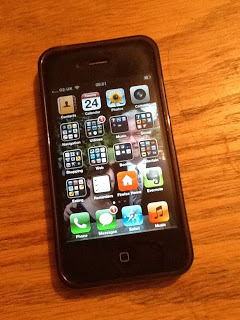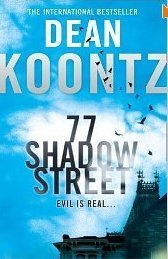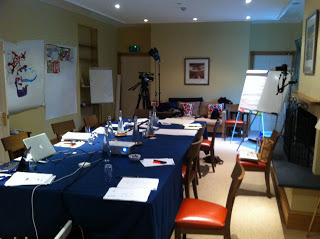Brian Clegg's Blog, page 150
January 25, 2012
The secret life of the Dell press office
 Spot the contact detailsI do a bit of consumer/technology journalism, which means I'm frequently in touch with technology press offices and PR companies. There was a time when you relied on a little black book of contacts, but these days you just zip onto the net and type in Company X Press Office and the details pop up. Unless you are trying to contact Dell. Their press office is so well hidden it verges on farce.
Spot the contact detailsI do a bit of consumer/technology journalism, which means I'm frequently in touch with technology press offices and PR companies. There was a time when you relied on a little black book of contacts, but these days you just zip onto the net and type in Company X Press Office and the details pop up. Unless you are trying to contact Dell. Their press office is so well hidden it verges on farce.Go to their News Room press office contacts page and you are told the following:
Note no phone, no email. Yes, the press office of one of the world's leading computer companies only provides a postal address. Snail mail. Nineteenth century at best.
Dell UK and Ireland Press OfficeDell ComputersInnovation HouseCherrywood Science and Technology ParkCherrywood, LoughlinstownDublin 18Ireland
Admittedly they do then go on to give a telephone number for 'UK Head Office Contacts' followed by a Bracknell address. Ah ha! Got em. But no. The phone number is for their (Indian) call centre. Who don't have any phone numbers for anyone. At all. But they do have an email address for the Marketing department. Excellent. If you can't get a press office, the marketing department is the next best thing. So I zap off an email. And get this reply:
Thank you for your mail. Please note this mailbox is used for outbound messaging only and therefore checked very infrequently. If you are internal to Dell, please contact the relevant member of the Marketing team to answer your query. Kind regards UK MarketingFor crying out loud! Dell Marketing or Dell Press Office - if you are monitoring this (and it's not impossible, I have had companies getting in touch as a result of my blogging about them), PLEASE drop me an email at brian@brianclegg.net so I can contact you. I want to write nice things about your computers. In a large circulation national magazine. But I can't if you hide. Come out, come out wherever you are...
P.S. A journalist contact has told me who their PR agency is (Axicom), so I'm fine. But this cloak and dagger stuff is still bizarre.
Published on January 25, 2012 09:06
January 24, 2012
Grow up, guys
 It's an iPhone - get over itAs long as Apple Computer has existed it has roused strong emotions. It has been a marmite company. You love it or you hate it. We shouldn't feel too sorry for Apple. They started it. Once they had the Mac, they undertook aggressive comparative marketing, putting the savvy, smart Mac against the creaking, boring PC. And they had a point. But back then I wouldn't have touched a Mac with a bargepole. They wouldn't work with anyone else's network, they had poor file interchangeability and they were closed systems that you couldn't add hardware to, nor could you do much with the software.
It's an iPhone - get over itAs long as Apple Computer has existed it has roused strong emotions. It has been a marmite company. You love it or you hate it. We shouldn't feel too sorry for Apple. They started it. Once they had the Mac, they undertook aggressive comparative marketing, putting the savvy, smart Mac against the creaking, boring PC. And they had a point. But back then I wouldn't have touched a Mac with a bargepole. They wouldn't work with anyone else's network, they had poor file interchangeability and they were closed systems that you couldn't add hardware to, nor could you do much with the software.So it's not surprising that back then there were strong pro and anti feelings. But I think it's time we got over it. Macs are good computers - so are PCs. Android phones are excellent - iPhones are brilliant. As yet the iPad is the only decent tablet, but it won't be for long.
It really quite saddens me when I see the silly, unthinking, knee-jerk reactions from the pro- and anti- camps springing to life. When a while ago I contemplated switching my desktop to Mac, I got plenty of emails and messages from Mac lovers telling me that it would transform my life. It really wouldn't. As it happens I decided it would transform my bank balance too much, and didn't go ahead, but the emotion in their response was worrying.
Similarly, a friend recently announced on Facebook that he'd got an Android mobile phone that was much cheaper than an iPhone. He immediately got a string of really quite nasty comments from his anti-iPhone friends. Comments included:
Nice phone - and Samsung are miles better than an Apple! - Well, I've compared them and no, they're not.iPhones, smart phones for the dumb - That's a really reasoned argument. Not at all ad hominem.With Android you can set it up exactly how you want, with iPhones you can set them up exactly how apple allow you to. - I'll come back to this.You resisted being assimilated then ! - Oh, please. I thought that penultimate one was interesting. It was certainly always the argument against Macs that swayed it for me when I was at BA. But in a phone it misses the point. Leaving aside that there's plenty you can do to change the setup of an iPhone, I don't want to have 'set it up exactly how I want', I want to be able to take it and use it. Someone else accused the iPhone as being style over substance - but concentrating on how you can set it up, as opposed to how good it is at its job, is exactly style over substance. The fact is the iPhone does the job brilliantly without having to faff about making it work.
But for that matter, in my experience, good Android phones work well too. (The difference with Android is that you get crap phones and great phones, so you have to avoid some.) Which brings me back to my original point. Lose the tribalism, guys. Apple make great, stylish products. If you want one, that's excellent. There are also great and more affordable PCs and Android phones. If you want one, that's excellent. Arguing you shouldn't buy an Apple product is like arguing we should all drive Fords and Vauxhalls. Arguing you should only buy Apple is like insisting everyone should go for Jaguars and Range Rovers. Remind me, what's all the fuss about?
Published on January 24, 2012 08:55
January 23, 2012
This book's a horror
 I love classic science fiction and fantasies set in the real world, but I've not ventured that much into reading horror. Okay, I've got a secret pleasure in Dennis Wheatley, and my favourite fantasy writers Ray Bradbury, Gene Wolfe and Neil Gaiman can all produce a form of horror but I've rarely gone for the pure thing. Apart from Mr Wheatley, my only real experience is Steven King. I think some of his work - particularly It - is surprisingly well written and pins you in place as a reader. So it was interesting to be sent the latest book by Dean Koontz, an author I've never tried - 77 Shadow Street.
I love classic science fiction and fantasies set in the real world, but I've not ventured that much into reading horror. Okay, I've got a secret pleasure in Dennis Wheatley, and my favourite fantasy writers Ray Bradbury, Gene Wolfe and Neil Gaiman can all produce a form of horror but I've rarely gone for the pure thing. Apart from Mr Wheatley, my only real experience is Steven King. I think some of his work - particularly It - is surprisingly well written and pins you in place as a reader. So it was interesting to be sent the latest book by Dean Koontz, an author I've never tried - 77 Shadow Street.To look at it's quite a chunky hardback, but I found it a reasonably quick read as it's a page turner. This is certainly my kind of horror, in the sense that it's fantasy horror, rather than simply man's inhumanity to man. The setting is very well built, and the sense of menace effectively done. It's interesting that I mentioned It earlier, as in some ways there are similarities - the dark, almost elemental inhuman force occupying an island of humanity and attacking it.
If I'm honest it's not as good a book as It. I don't think Koontz produces the same quality of writing as King. It's fine, but lacks the finesse. He also spent far too long on the build. Although there are lots of strange goings on, nothing definitive happens for well over 100 pages. There's also far too much internal narrative from the characters. We get page after page of their thoughts. I sometimes wanted to scream at Mr Koontx that creative writing mantra SHOW, DON'T TELL!
And the final problem is that it suffers from California Suite syndrome. I'm sure everyone knows those films that ought to be great because they have lots of great actors in them, but that fall down because there isn't a main character or characters to identify with. Instead we get a whole cast of different people and follow their intertwining storylines. Great idea, but it never quite works. The audience is always distanced. And the same things happen here. We meet all the different characters who live and work in apartment building - but it's difficult to get too involved with any of them.
All that said, this is an intriguing story, Koontz is quite brave in introducing several mysterious and confusing characters long before there's any certainty of what they are - and parts of it are genuinely horrific in a good way. What's more there is an excellent twist in the storyline (though you have to get past page 300 to reach it), even though the premise depends on a highly unlikely coincidence that one of only two people in the world that would enable this storyline lives in a specific house. As long as you are happy with suspension of disbelief, it's definitely a book I'd recommend trying, and I may well try some more Koontz as a result of reading this. You can see more at Amazon.co.uk and Amazon.com.
P.S. - funny how the mind works. I was just loading the cover photo above and read the tag line as 'Elvis is real.' Sigh.
Published on January 23, 2012 09:52
January 20, 2012
Seven steps to a better brainstorm
 All we need now is some brainsI was rather pleased to be interviewed the other day by CNN on the subject of brainstorming. It's one of those subjects that it's easy to mock, because it is often done so badly. It probably featured on The Office. Yet do it right and it's very powerful.
All we need now is some brainsI was rather pleased to be interviewed the other day by CNN on the subject of brainstorming. It's one of those subjects that it's easy to mock, because it is often done so badly. It probably featured on The Office. Yet do it right and it's very powerful.If you want to see brainstorming done badly, just watch an episode of The Apprentice. It's almost like they follow a rule book called 'How Not to Brainstorm' (or Brianstorm as I just typed). They sit round a whiteboard and think up ideas. Some get written down, some are ignored. Many will be argued with. And they end up with some fairly feeble ideas. And go with one. Not a great advert for the process.
If you are going to brainstorm I'd suggest seven steps for success:
Make sure you are addressing the right problem. Don't rush in and assume you know what it is you need to do. Quickly think through just what it is you are trying to achieve and see if their are alternative problems to solve that would give a better solution.Use a technique to generate ideas. When Alex Osborn devised brainstorming he never intended people just to sit down and wait for inspiration. Use a simple idea generation technique, like using a randomly selected picture to generate a string of associations, then apply each of those associations as a starting point to solving your problem. (If that description is too condensed, see the ebook below for more details.) That way you will come at things differently and are more likely to come up with fresh ideas. It's fine to use top-of-the-head ideas too, but they often won't be the best.No negatives, no editing. All new ideas are easy to shoot down. Collect all ideas at this stage, however impractical. Make sure whoever is writing up captures everything - don't let them edit as they go. Stop anyone in their tracks if they try to criticize an idea.Give it some structure. I like putting each idea on a Post-it note. That way, when you've collected them you can move them around and structure them, bringing similar ideas together etc. Alternatively capture the ideas on a mind map, preferably using software and projecting the result on a big screen so everyone can see - that way you can restructure easily.Choose wisely. Don't select ideas on practicality, but rather on wow factor. It's much easier to take an exciting but impractical idea and make it practical than it is to take a practical but dull idea and give it appeal. Give everyone an imaginary £100 to vote with. They can put it all on their favourite idea, or split it as they like, but make sure they vote on appeal, not practicality. Be prepared to go back and develop more than one idea.Improve the ideas. Once you've selected an idea, refine it. Identify the key good points. Then find the main things wrong with. Finally improve the idea to get rid of the bad points, but keep the good points in front of you as a reminder. It's very easy to lose these as you fix the bad. Make sure your fixes don't wipe out the benefits.Prepare for selling and implementation. It's very easy when you're all excited about an idea to rush out and tell everyone without thinking about practicalities. Make sure you know how you are going to sell your idea to anyone who has to give it the go-ahead, and have an outline of how you will implement it. That way you are much more likely to get it into practice.It sounds a lot, but it's actually very simple - and makes all the difference. If you want to find out a bit more I have a free ebook Instant Brainstorming you can download here.
Published on January 20, 2012 09:29
January 19, 2012
I don't believe it
I was interested to see that loveable old grumpy Richard Wilson on TV the other night moaning about all the automated systems we have to deal with.
A lot of it was fair enough. I mean, who could love automated telephone menu systems? (Can anyone explain how on over 50% of the calls I make, whatever time of day, they appear to be experiencing higher than usual call volumes?) And I agree that those systems for paying for car parking by phone are a nightmare. But there was one thing they got wrong - and the way they went about it was very naughty.
Young Mr Wilson was moaning about supermarket self-checkouts. To try out (or rather to try to disprove) the claim that they are quicker to use, they took an immense sample of four people to compare self-checkout and going through a traditional till. And it was a fiasco of a test.
Firstly they compared the times for the two checkout processes from the point the checkout started. This misses the whole point, dumbos! When I go into the little Tesco which contains our Post Office, the manned checkout always has a queue of 3 to 4 people. At least one of the self checkouts is nearly always available. What you should compare is the time from entering the queue, not the time from starting checking out. Doh.
Secondly, they had suspiciously many problems with the self checkout. (I noticed one of the testers had actually put a piece of paper over the scanner and then spent ages wondered why it wouldn't scan.) I think the best of them had to be rescued by the operator about five times. Now I use a self checkout most days. And I'd say over half the times there are no interventions, and the rest there is usually one or two. I don't think I've ever had five. It was just ludicrous.
So Channel 4, by all means attack the irritating systems that give no benefit - but do it in a fair way. This was very naughty indeed.
A lot of it was fair enough. I mean, who could love automated telephone menu systems? (Can anyone explain how on over 50% of the calls I make, whatever time of day, they appear to be experiencing higher than usual call volumes?) And I agree that those systems for paying for car parking by phone are a nightmare. But there was one thing they got wrong - and the way they went about it was very naughty.
Young Mr Wilson was moaning about supermarket self-checkouts. To try out (or rather to try to disprove) the claim that they are quicker to use, they took an immense sample of four people to compare self-checkout and going through a traditional till. And it was a fiasco of a test.
Firstly they compared the times for the two checkout processes from the point the checkout started. This misses the whole point, dumbos! When I go into the little Tesco which contains our Post Office, the manned checkout always has a queue of 3 to 4 people. At least one of the self checkouts is nearly always available. What you should compare is the time from entering the queue, not the time from starting checking out. Doh.
Secondly, they had suspiciously many problems with the self checkout. (I noticed one of the testers had actually put a piece of paper over the scanner and then spent ages wondered why it wouldn't scan.) I think the best of them had to be rescued by the operator about five times. Now I use a self checkout most days. And I'd say over half the times there are no interventions, and the rest there is usually one or two. I don't think I've ever had five. It was just ludicrous.
So Channel 4, by all means attack the irritating systems that give no benefit - but do it in a fair way. This was very naughty indeed.
Published on January 19, 2012 08:21
January 18, 2012
When does a gift become a bribe?
 A product I've never reviewedThe other day I got an email from a PR agency that was more like the sort of scam that originates from Nigeria. The email (I won't name the agency to spare their blushes) said:
A product I've never reviewedThe other day I got an email from a PR agency that was more like the sort of scam that originates from Nigeria. The email (I won't name the agency to spare their blushes) said:I'm updating the finance database to ensure any future payments will not be delayed. Could you provide me your banking details, please?Although I've had information from this agency plenty of times, I've never done any work for them. Scamming apart, my immediate thought when putting 'PR agency' alongside 'payment' was around the area of bribery. It wouldn't surprise me if those who read reviews suspect that reviewers are being given lots of goodies, if not downright cash payments, to write good things.
Now I've been writing reviews since the 1990s - it's how I started in professional writing - and I have to say that, on the whole it is all squeaky clean and above board. If the product has a low production cost (software, for example, only has the incremental cost of the medium it is distributed on), then chances are you will be allowed to keep it. And I admit this used to be quite good when I was reviewing business software costing £200 a pop. But in my experience hardware manfacturers hardly ever let you keep anything. Even getting your hands on a review product can be quite difficult, and then it's only for a limited time period.
Similarly I've never been sent nice Christmas presents by PR companies or manufacturers. (Hint.) Not that it would make any difference. It's true that when I did a lot of IT journalism, we often got given some goodies for attending a product launch or briefing (I still use my Windows 95 bag), but this seemed much more a thank-you for your time, rather than anything to influence what you wrote.
I'm not saying it never happens. When I was reviewing business software I did get one blatent attempt at bribery. Someone from a PR agency (I genuinely can't remember which) rang and said that they would like me to write an open review of a new product (i.e. not for a specific magazine) and as long as I made sure it was very positive they would pay me a four figure sum. I told the PR where to stick it, and he sounded genuinely offended and shocked that I would turn down what could only be seen as a bribe. He didn't quite say 'You'll never work in this business again,' but there was a hint of it.
That, though, was a one-off with what I assume was a bad penny. On the whole the only inducement to write something nice is the urge to please the nice PR people (or in the case of a book, the author). So I'm sure that the PR agency asking for my bank details wasn't intending to slip me a little something. Professional reviews are, on the whole, pretty upright things in the UK - and that can't be bad.
Published on January 18, 2012 08:34
January 17, 2012
The mysteries of technology
As you may have gathered by now, I rather love my iPad and use it all the time. When, for example, I get sent proofs of my books to check through as PDFs, I tend to fling them over to the iPad and read them on there, as I find it much easier to read a document that way than on a computer screen. But the only danger is that you are at the mercy of the quality of the software interpreting the PDFs, which don't have as straightforward a file format as an image file. I discovered this recently when I was looking at the proof of a page from an illustrated book I've got out later this year. Part of one of the pages looked like this:
 You can see there's a statue of Galileo to the left and to the right, bleeding across to the next page is a strange bit of hieroglyphics like something out of the Da Vinci Code. Very nice, I thought, but what does it mean?
You can see there's a statue of Galileo to the left and to the right, bleeding across to the next page is a strange bit of hieroglyphics like something out of the Da Vinci Code. Very nice, I thought, but what does it mean?
So I sent a note to the editor, who came back swiftly, something to the effect of 'Isn't it obvious? It's Galileo's signature.' Well no, it wasn't obvious. But then I was struck with one of those IT inspirations. I thought I'd take a look at the same PDF on my computer. And this time, this is what I saw:

Now this is exactly the same file. All that I have changed is the device I'm looking at it with (and hence the software interpreting the PDF).
I'll continue to use the iPad to read PDFs as it is so much better an experience than doing it on a conventional screen. But in future, if anything looks strange, my first port of call will be to check what it looks like back on the old dinosaur machine.
 You can see there's a statue of Galileo to the left and to the right, bleeding across to the next page is a strange bit of hieroglyphics like something out of the Da Vinci Code. Very nice, I thought, but what does it mean?
You can see there's a statue of Galileo to the left and to the right, bleeding across to the next page is a strange bit of hieroglyphics like something out of the Da Vinci Code. Very nice, I thought, but what does it mean? So I sent a note to the editor, who came back swiftly, something to the effect of 'Isn't it obvious? It's Galileo's signature.' Well no, it wasn't obvious. But then I was struck with one of those IT inspirations. I thought I'd take a look at the same PDF on my computer. And this time, this is what I saw:

Now this is exactly the same file. All that I have changed is the device I'm looking at it with (and hence the software interpreting the PDF).
I'll continue to use the iPad to read PDFs as it is so much better an experience than doing it on a conventional screen. But in future, if anything looks strange, my first port of call will be to check what it looks like back on the old dinosaur machine.
Published on January 17, 2012 10:50
January 16, 2012
At last I get rap
The other day I was listening to a bit of hard core, or possibly thrash metal, the way you do. At least, the way you do if your children insist on listening to Radio 1 sometime around midnight when you pick them up, even if they can't stand the music. And I had a bit of an epiphany.
For a long time I have struggled to articulate why I dislike rap so much - and hearing this stuff made me realize what the answer is. I didn't enjoy the hardcore/thrash sounds that were coming from the car speakers. It really wasn't my kind of thing. The closest you'll find on my iPod is somewhere between Van der Graaf Generator and Pink Floyd at their most destructive. But I could appreciate what I was hearing as music. It clearly was someone producing music, and what they were doing had obvious antecedents in the musical tradition.
What I hear when I listen to a rap 'song' has a totally different antecedent. Where those extreme forms of rock grew from heavy metal, which came out of mainstream rock, rap clearly came out of a child, standing on a kitchen table showing off. Saying 'Hey, this is me! Aren't I clever with all these words I can say? Look at me! This is my name. Aren't I great?'
The reason I've never understood rap is that I was thinking of it as music, rather than simply childish showing off. Silly me. Now I get it.
For a long time I have struggled to articulate why I dislike rap so much - and hearing this stuff made me realize what the answer is. I didn't enjoy the hardcore/thrash sounds that were coming from the car speakers. It really wasn't my kind of thing. The closest you'll find on my iPod is somewhere between Van der Graaf Generator and Pink Floyd at their most destructive. But I could appreciate what I was hearing as music. It clearly was someone producing music, and what they were doing had obvious antecedents in the musical tradition.
What I hear when I listen to a rap 'song' has a totally different antecedent. Where those extreme forms of rock grew from heavy metal, which came out of mainstream rock, rap clearly came out of a child, standing on a kitchen table showing off. Saying 'Hey, this is me! Aren't I clever with all these words I can say? Look at me! This is my name. Aren't I great?'
The reason I've never understood rap is that I was thinking of it as music, rather than simply childish showing off. Silly me. Now I get it.
Published on January 16, 2012 08:05
January 13, 2012
Standing on the shoulders of giants
 With permission of the Institute of PhysicsThe seventeenth century physicist Robert Hooke has had something of a roller coaster ride of a history.
With permission of the Institute of PhysicsThe seventeenth century physicist Robert Hooke has had something of a roller coaster ride of a history.Although Hookes' law on the elasticity of springs has kept his name visible, he largely disappeared as a person in the glare of the spotlight placed on his indubitably great contemporary and rival Isaac Newton.
When Hooke re-emerged onto the world stage it became briefly fashionable to belittle Newton and big up Hooke's achievements. Now we have mostly got more of a balance. Hooke did do a remarkable amount in his own right. Yet the feud between Hooke and Newton was certainly not one-sided. In fact it started when Hooke dismissed Newton's paper on light and colour without even bothering to read it. And there is good evidence that Hooke had a tendency to claim other people's ideas as his own.
But there is no doubt that Hooke was a great experimenter, science populariser (his book of drawings of microscopic views is still stunning) and had some theoretical ideas that helped Newton immensely. For instance Hooke suggested using a pendulum to measure the acceleration due to gravity. And it was Hooke who realized that an object in orbit is freely falling towards the body it orbits, while at the same time moving sideways at the right speed to keep missing it. We know that Newton got this idea from Hooke because he wrote to Hooke that he had never heard of this hypothesis before. When the Principia was published, Hooke claimed that Newton had stolen his ideas, yet in letters between the two, it seems that Hooke had got as far as he could manage and was encouraging Newton to take his ideas further – something Newton certainly would.
Now the Insitute of Physics is celebrating Hooke's achievements in the rather imposing painting pictured here. It's an impressive work of imagination. Apparently the only known portrait of Hooke was destroyed in the early 1700s (possibly at Newton's instructions), so this image can only go on descriptions. We know Hooke had something of a hunched back and (in part as a result) did not come across as a particularly large man. It seems likely that when Newton quoted the remark in a letter to Hooke that if he had seen further it was by standing on the shoulders of giants, it was a bit of a dig, as Hooke was anything but a giant physically.
It's probably also worth saying that the artist, Rita Greer buys into the now largely discredited extreme view that Hooke's genius remains a surpressed fact thanks to Newton's hatred of him. She comments 'Robert Hooke, brilliant, ingenious seventeenth century scientist was brushed under the carpet of history by Sir Isaac Newton and his cronies. When he had his Tercentenary there wasn't a single memorial to him anywhere. I thought it disgraceful as Hooke did many wonderful things for science.' Note the emotive word 'cronies'.
But even though it's certainly not true that Hooke is regarded in a lowly fashion any more, it doesn't do us any harm to be reminded of this remarkable man. I find the idea of this being a portrait of Hooke when we don't really know what he looked like rather odd. It clearly isn't a portrait. But it is a powerful image to make us think about Hooke's achievements, and as such should be celebrated.
The portrait was hung yesterday at the Institute of Physics in London.
Published on January 13, 2012 09:30
January 12, 2012
Food of the gods
 It's Royal Society of Chemistry podcast time again.
It's Royal Society of Chemistry podcast time again.What can you say about a substance that brings us back time and again to a favourite treat, but is poisonous to dogs? We're talking theobromine (literally food of the gods from the Greek), the main active ingredient in chocolate. In fact this close relative of caffeine is poisonous to all mammals to some degree - us included - but you would have to eat a very large amount to suffer. Cats are even more susceptible... but they don't have a sweet receptor among their taste buds, so don't care much. Take a listen and find out more.
Published on January 12, 2012 08:07



